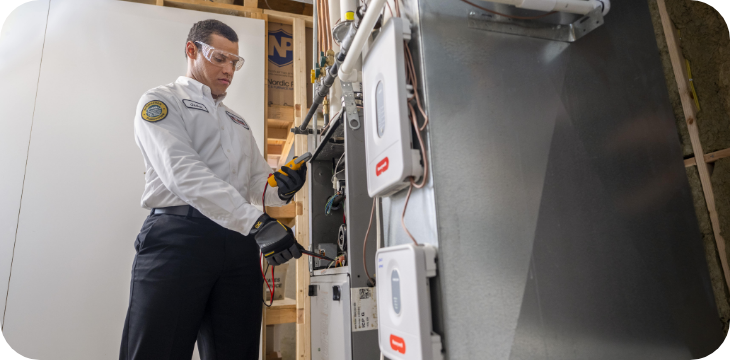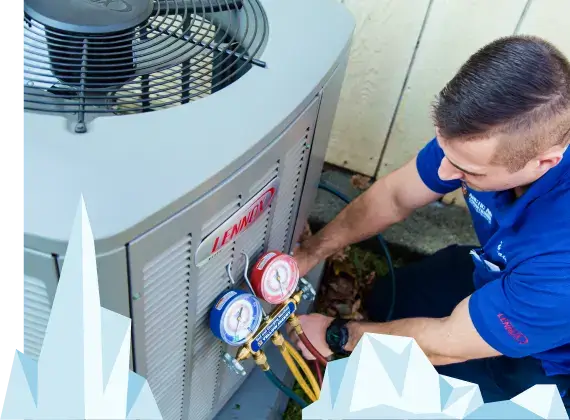Solve Heating Issues Quickly with DMAKS HVAC Repairs.
Solve Heating Issues Quickly with DMAKS HVAC Repairs.
Blog Article
Energy-Efficient HVAC Solutions to Minimize Utility Bills
As energy prices proceed to increase, the significance of energy-efficient Cooling and heating systems becomes increasingly evident. These systems not only guarantee substantial financial savings on energy costs yet additionally add to a much more sustainable future by decreasing power consumption.
Benefits of Energy-Efficient Heating And Cooling Equipments
Energy-efficient Heating and cooling systems use numerous benefits that extend beyond mere expense financial savings. By eating much less power, these systems contribute to decrease greenhouse gas discharges, assisting to fight environment modification and advertise sustainability.
Additionally, energy-efficient a/c systems commonly give enhanced comfort degrees. Several of these systems feature advanced innovation that permits for better temperature control and enhanced air quality (DMAKS HVAC). This leads to a healthier indoor environment, which is particularly important for people with allergic reactions or breathing issues
Additionally, spending in energy-efficient HVAC systems can boost home value. As more customers focus on energy performance, homes and buildings outfitted with these systems may draw in higher bids in the realty market.
Sorts Of Energy-Efficient Heating And Cooling Options
How can property owners and businesses pick one of the most suitable energy-efficient cooling and heating choices for their requirements? The market uses a variety of energy-efficient heating and cooling systems, each created to improve comfort while minimizing power usage.
One alternative is the variable cooling agent flow (VRF) system, which efficiently regulates the temperature level in numerous zones within a structure. This system adjusts its cooling agent flow to match the desired temperature level, resulting in significant power financial savings.
One more popular selection is geothermal heatpump, which utilize the earth's secure temperature to warm and great rooms. By transferring warmth to and from the ground, these systems demonstrate impressive effectiveness, specifically in moderate environments.
Additionally, ductless mini-split systems offer an energy-efficient alternative for homes lacking ductwork. These systems permit zone-specific heating & cooling, decreasing energy waste in vacant locations.
Lastly, high-efficiency heating systems and air conditioners, with sophisticated SEER and AFUE rankings, offer trustworthy climate control while eating much less power than traditional designs. By evaluating these alternatives, house owners and businesses can pick a HVAC system customized to their details needs and energy performance objectives.
Key Features to Consider

Next, explore the kind of compressor utilized in the system. DMAKS HVAC. Variable-speed compressors can adjust their result to match the home heating or cooling demand, causing boosted convenience and energy savings contrasted to single-speed versions. In addition, try to find systems equipped with smart thermostats that provide programmable setups and remote gain access to, permitting for better control over power consumption
Another crucial feature is the system's air filtration capability. High-efficiency filters can enhance indoor air high quality and reduce energy consumption by making sure the system operates effectively. Moreover, take into consideration the kind of cooling agent made use of; modern-day systems usually employ environment-friendly refrigerants that have a lower environmental influence.
Finally, make certain that the system works with zoning modern technology, which permits for personalized temperature control in different locations of your home, enhancing convenience while reducing power use.
Tips for Picking the Right System


Next, take into consideration power efficiency ratings, specifically the Seasonal Power Effectiveness Ratio (SEER) for cooling down systems and the Annual Gas Use Efficiency (AFUE) for heating systems. Greater scores suggest greater performance, which can cause considerable savings on utility bills with time.
Furthermore, assess the kind of a/c system that ideal suits your lifestyle and budget. Alternatives include central air conditioning, ductless mini-splits, and heatpump, each with its own collection of advantages and drawbacks.
Don't neglect the importance of correct installation and webpage sizing; an inaccurately sized system can cause inefficiencies and increased wear. Last but not least, speak with a specialist heating and cooling service provider to acquire professional referrals tailored to your home's special needs. This comprehensive technique will guarantee that you pick an energy-efficient HVAC system that satisfies your demands and budget effectively.
Upkeep for Optimum Efficiency
When the ideal HVAC system remains in place, continuous upkeep becomes vital to making sure ideal effectiveness and durability. A properly maintained system runs a lot more successfully, causing lower power intake and minimized utility expenses. Normal inspections and tune-ups ought to be arranged at the very least two times a year-- as soon as prior to the air conditioning season and once prior to the home heating period.

House owners should additionally be watchful concerning monitoring their HVAC system's efficiency. Uncommon noises, changing temperatures, or boosted energy expenses can show underlying issues that need immediate interest. By attending to these concerns promptly, home owners can protect against pricey repair work and extend the life-span Check This Out of their systems.
Buying a maintenance plan with a qualified technician not only improves effectiveness yet also supplies comfort, knowing that the system is operating at its finest. DMAKS HVAC. Normal upkeep is therefore crucial for sustaining power effectiveness and reducing general operational costs
Conclusion
In verdict, energy-efficient cooling and heating systems provide a feasible service for reducing utility bills while enhancing comfort and air top quality. By including innovative technologies and alternatives such as geothermal heatpump and ductless mini-splits, homeowner can achieve significant power savings and add to ecological sustainability. Mindful consideration of system features and continuous upkeep further guarantees optimal performance, making energy-efficient systems a sensible financial investment for both economic and ecological advantages.
Report this page